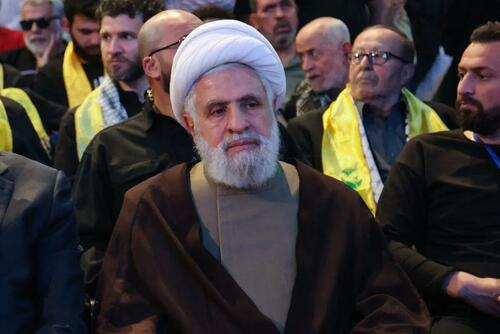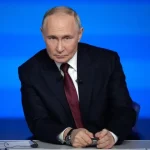
In his third major address since becoming Hezbollah's Secretary General in the wake of Hassan Nasrallah's death, Naim Qassem threatened to target Tel Aviv in response to recent Beirut strikes.
"We will not leave the capital under Israeli enemy attacks. When Beirut is under attack by the enemy, the response must be in Tel Aviv," he said. The Hezbollah chief added that "The enemy must understand that things will not remain as such when Beirut is attacked."
He laid out that Israel must pay a "heavy price" for the assassination of Hezbollah media relations chief Mohammed Afif this week, which happened in Beirut.
Drones and rockets fired from Lebanon into Tel Aviv have already begun ramping up in the past days, even though such targeting that deep into Israel remains rare.
Monday saw a Hezbollah missile strike Tel Aviv, near a shopping mall and busy area, which wounded five people and caused extensive damage.
Tehran Times reports, "An Israeli media outlet reported among the missiles that landed in Tel Aviv was a Fateh 110 missile, which is a surface-to-surface missile recognized for its significant destructive power. It is engineered to strike critical targets with pinpoint accuracy within a margin of up to ten meters."
Currently, Biden's Middle East envoy Amos Hochstein is going between warring capitals, seeking to finalize a US-proposed peace plan.
Hezbollah and the Lebanese government are said to be backing the ceasefire, and are awaiting Israel's response. However, the prospect that a ceasefire will be reached soon doesn't look promising. Below is what Secretary-General Qassem said in his speech regarding the plan:
"We got the negotiation document, we examined the document and we transferred our notes about it," he said. This comes as Hochstein delayed his arrival in Israel as he attempts to smooth over more details of the deal.
In Qassem's opinion, "Israel expects to get through the agreement what it did not get on the ground," referring to the Israeli ground operations in southern Lebanon. Several attempts to reach an end to hostilities have failed, including those proposed by US President Joe Biden and French President Emmanuel Macron.
"In the past, we agreed to the Biden-Macron proposal on the basis of ending the war, but they killed Nasrallah," Qassem said. "We went through a real crisis after his assassination, but after 10 days we managed to recover and heal our wounds."
Hezbollah has been revealing an ever-more sophisticated drone arsenal...
⚡️Hezb-Allah publishes first footage from onboard a Kamikaze drone pic.twitter.com/4FdGE6D8Jd
— War Monitor (@WarMonitors) November 18, 2024
Many details of the plan remain secret. At this moment, the skies over Lebanon are as dangerous as ever, with Israeli warplanes pounding Beirut, the Bekaa Valley, Tyre and the south, and especially the capital suburb of Dahieh.
In his third major address since becoming Hezbollah’s Secretary General in the wake of Hassan Nasrallah’s death, Naim Qassem threatened to target Tel Aviv in response to recent Beirut strikes.
“We will not leave the capital under Israeli enemy attacks. When Beirut is under attack by the enemy, the response must be in Tel Aviv,” he said. The Hezbollah chief added that “The enemy must understand that things will not remain as such when Beirut is attacked.”
He laid out that Israel must pay a “heavy price” for the assassination of Hezbollah media relations chief Mohammed Afif this week, which happened in Beirut.
Drones and rockets fired from Lebanon into Tel Aviv have already begun ramping up in the past days, even though such targeting that deep into Israel remains rare.
Monday saw a Hezbollah missile strike Tel Aviv, near a shopping mall and busy area, which wounded five people and caused extensive damage.
Tehran Times reports, “An Israeli media outlet reported among the missiles that landed in Tel Aviv was a Fateh 110 missile, which is a surface-to-surface missile recognized for its significant destructive power. It is engineered to strike critical targets with pinpoint accuracy within a margin of up to ten meters.”
Currently, Biden’s Middle East envoy Amos Hochstein is going between warring capitals, seeking to finalize a US-proposed peace plan.
Hezbollah and the Lebanese government are said to be backing the ceasefire, and are awaiting Israel’s response. However, the prospect that a ceasefire will be reached soon doesn’t look promising. Below is what Secretary-General Qassem said in his speech regarding the plan:
“We got the negotiation document, we examined the document and we transferred our notes about it,” he said. This comes as Hochstein delayed his arrival in Israel as he attempts to smooth over more details of the deal.
In Qassem’s opinion, “Israel expects to get through the agreement what it did not get on the ground,” referring to the Israeli ground operations in southern Lebanon. Several attempts to reach an end to hostilities have failed, including those proposed by US President Joe Biden and French President Emmanuel Macron.
“In the past, we agreed to the Biden-Macron proposal on the basis of ending the war, but they killed Nasrallah,” Qassem said. “We went through a real crisis after his assassination, but after 10 days we managed to recover and heal our wounds.”
Hezbollah has been revealing an ever-more sophisticated drone arsenal…
⚡️Hezb-Allah publishes first footage from onboard a Kamikaze drone pic.twitter.com/4FdGE6D8Jd
— War Monitor (@WarMonitors) November 18, 2024
Many details of the plan remain secret. At this moment, the skies over Lebanon are as dangerous as ever, with Israeli warplanes pounding Beirut, the Bekaa Valley, Tyre and the south, and especially the capital suburb of Dahieh.
Loading…





